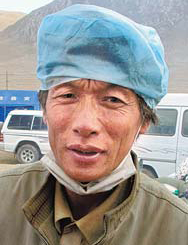Rescue & Aid
Embracing a new life together
By Zhang Jin (China Daily)
Updated: 2010-04-26 07:04
 |
Large Medium Small |
Qinghai earthquake victims help each other survive. Zhang Jin reports from Yushu.
As dawn began to spill bright sunshine across Baizha village in Gyegu at 5:30 am on Sunday, Tsungmed Wenmon was already awake and starting to prepare breakfast. For the past 10 days, she has not only been cooking for her family, but also for dozens of other survivors of the April 14 earthquake in Qinghai province.
Every morning, before the rest of her family have woken, Tsungmed Wenmon, 17, gets up and walks to a nearby creek to fill a battered iron pan she dug out from the rubble. She then makes tsamba, a traditional Tibetan dish made with roasted barley flour, pure butter and water.
Tsungmed Wenmon's house collapsed when the 7.1-magnitude tremor hit and, like thousands of others, her parents now live in a blue tent set up beside their home by local authorities. Her younger sisters - aged 16 and 14 - refuse to stay in the tent because they fear nearby buildings may crush them if there is another tremor. They sleep outside, cocooned in two large overcoats.
|
 |
|
Pug Tashi, head of Baizha, who monitors relief supplies. |
After being roused by the smell of breakfast, the family gathers to eat the tsamba, as well as biscuits and noodles given to them by government relief workers.
Any fellow survivors that approach, even if they are complete strangers, are immediately invited to join them.
"All of my family survived the earthquake but some people lost almost all of their loved ones. Hopefully, they won't feel as lonely if we let them come to join us for a meal," said Tsungmed Wenmon's father Tse Tashi, 55.
At one point on Sunday, as many as seven people sat with the family as they ate tsamba, drank tea and chatted. Some also contributed their relief supplies to share at the feast.
Breakfast now regularly lasts about three hours and, during that time, many people come and go. Tse Tashi said he does not even learn most guests' names. One couple brought their 2-year-old daughter, who spent the morning running around and playing with a stuffed bear.
Stories of Qinghai earthquake victims helping each other to survive are becoming legion and authorities have been quick to praise the selfless spirit being shown by those in the disaster zone.
"If people didn't help each other it would be impossible for them to restart their lives after the earthquake," said Geng Yang, director of Qinghai's department of civil affairs. "Fortunately, the people in the disaster areas, most of whom are ethnic Tibetans and herdsmen, are more than willing to help other overcome the natural disaster together."
The harsh conditions in the mountainous province - high altitudes, low oxygen levels and volatile weather - have always made it a difficult place to live, "yet this has helped foster a strong team spirit over the years", he said. "In cities, people don't know or care about their neighbors. This is not the case in Qinghai."
Restoring order
At a temporary resettlement camp in Yushu county, epicenter of the earthquake, lines of blue tents stretch across an area the size of about 10 football fields. The camp is home to more than tens of thousands of people left homeless by the disaster.